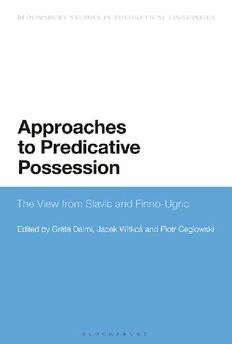Download Approaches to Predicative Possession: The View from Slavic and Finno-Ugric PDF Free - Full Version
Download Approaches to Predicative Possession: The View from Slavic and Finno-Ugric by Jacek Witkoś; Piotr Cegłowski in PDF format completely FREE. No registration required, no payment needed. Get instant access to this valuable resource on PDFdrive.to!
About Approaches to Predicative Possession: The View from Slavic and Finno-Ugric
This book discusses existential and possessive constructions in two important, yet under-studied, language families, Slavic and Finno-Ugric. Using data from the Slavic languages of Polish, Belarusian and Russian, and the Finno-Ugric languages of Finnish, Hungarian, Meadow Mari, Komi-Permiyak and Udmurt, as well as the closely related Selkup of the Samoyedic family, the chapters in this volume analyse predicative possession in current syntactic terms.Seeking an answer to the theoretical question of whether BE-possessives and HAVE-possessives are just accidental values of the 'Possessive Parameter' or are intrinsically related, this book takes a comparative approach to a whole range of syntactic and semantic phenomena that appear in these constructions, including the definiteness restriction, genitive of negation, person/number agreement, argument structure and extractability. The individual case studies can be easily integrated into the Principles & Parameters framework in terms of parametric variation. Approaches to Predicative Possession is an important contribution to our understanding of predicative possession across languages, with findings that can be fruitfully extended to other language families. It is an equally useful source of information for theoretical linguists, typologists, and graduate students of linguistics.
Detailed Information
| Author: | Jacek Witkoś; Piotr Cegłowski |
|---|---|
| Publication Year: | 2020 |
| ISBN: | 9781350062474 |
| Pages: | 241 |
| Language: | English |
| File Size: | 3.411 |
| Format: | |
| Price: | FREE |
Safe & Secure Download - No registration required
Why Choose PDFdrive for Your Free Approaches to Predicative Possession: The View from Slavic and Finno-Ugric Download?
- 100% Free: No hidden fees or subscriptions required for one book every day.
- No Registration: Immediate access is available without creating accounts for one book every day.
- Safe and Secure: Clean downloads without malware or viruses
- Multiple Formats: PDF, MOBI, Mpub,... optimized for all devices
- Educational Resource: Supporting knowledge sharing and learning
Frequently Asked Questions
Is it really free to download Approaches to Predicative Possession: The View from Slavic and Finno-Ugric PDF?
Yes, on https://PDFdrive.to you can download Approaches to Predicative Possession: The View from Slavic and Finno-Ugric by Jacek Witkoś; Piotr Cegłowski completely free. We don't require any payment, subscription, or registration to access this PDF file. For 3 books every day.
How can I read Approaches to Predicative Possession: The View from Slavic and Finno-Ugric on my mobile device?
After downloading Approaches to Predicative Possession: The View from Slavic and Finno-Ugric PDF, you can open it with any PDF reader app on your phone or tablet. We recommend using Adobe Acrobat Reader, Apple Books, or Google Play Books for the best reading experience.
Is this the full version of Approaches to Predicative Possession: The View from Slavic and Finno-Ugric?
Yes, this is the complete PDF version of Approaches to Predicative Possession: The View from Slavic and Finno-Ugric by Jacek Witkoś; Piotr Cegłowski. You will be able to read the entire content as in the printed version without missing any pages.
Is it legal to download Approaches to Predicative Possession: The View from Slavic and Finno-Ugric PDF for free?
https://PDFdrive.to provides links to free educational resources available online. We do not store any files on our servers. Please be aware of copyright laws in your country before downloading.
The materials shared are intended for research, educational, and personal use in accordance with fair use principles.

